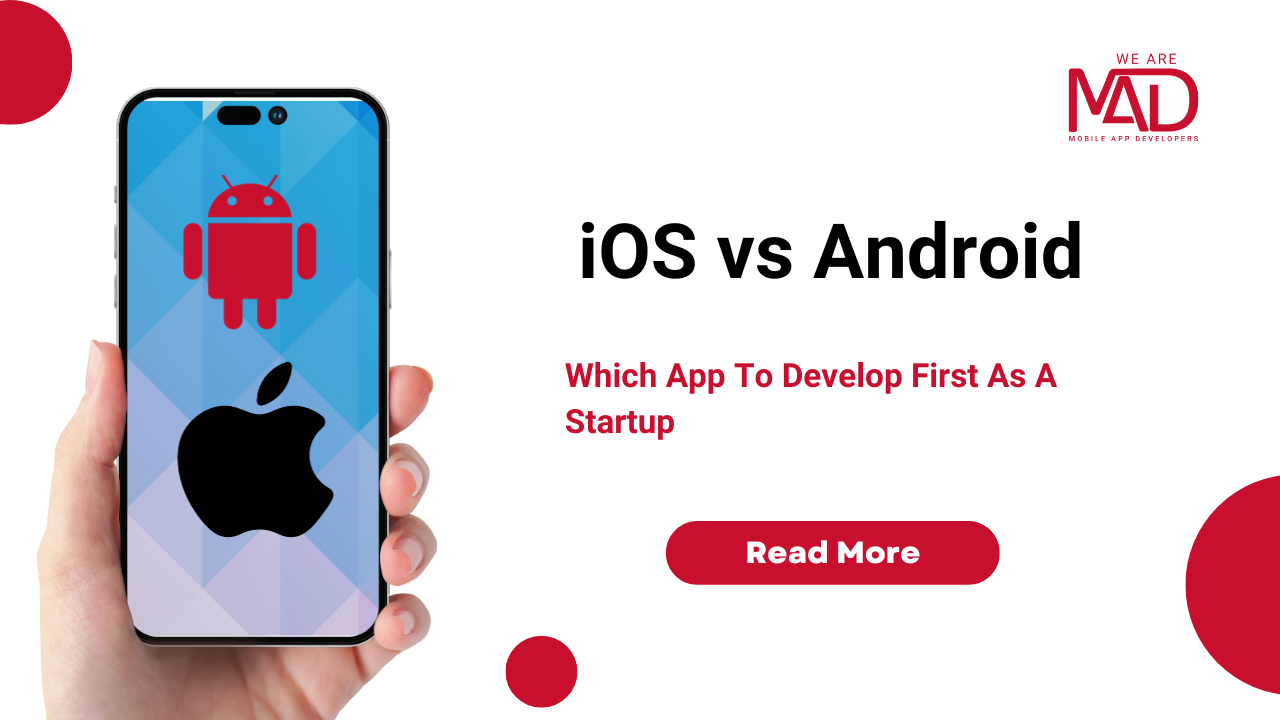
Both iOS and Android have an equal market share in the UK, with iOS holding 50.8% and Android nearly 49%. This confuses startups that want to develop an app about which platform to develop first.
While it is possible to develop native apps for both simultaneously, it can be a challenge for startups with limited budgets. MAD aims to guide startups facing this dilemma with this blog.
So, let’s dive right into it!
Both iOS and Android come with their pros and cons for startups. To clear up the confusion, we will explain the revenue potential, development time, maintenance requirements, and more of both platforms to guide you in making the right decision.
The user base matters a lot when you prioritise reach and engagement. While the difference is marginal in the UK, things are different internationally. Android holds the lion’s share of the global market, 70.77%, to be exact.
If you want to get maximum reach for your business, Android is the way to go. It has way more opportunities for user engagement. However, wider reach does not necessarily translate to more revenue. This brings us to our next point.
Things take a turn when we talk about revenue generation. Even with a smaller user base, the Apple App Store actually generates 85% more revenue than the Google Play Store. This is because iOS users generally have higher disposable incomes. They are willing to spend money on purchasing apps, in-app purchases, and subscriptions.
Android does have a larger user base, but a significant portion of its users prefer free apps with ads or are reluctant to pay for in-app purchases. This makes monetising Android apps a little challenging. However, with the right strategy, you can generate substantial revenue from Android apps.
iOS app development is often considered more streamlined and efficient. This is because Apple provides a unified development environment through Xcode.
Also, the number of iOS devices is far less compared to Android. Generally, Apple launches two iPhone models every year, the base model and the pro variant. The testers have a limited number of devices and screen sizes to test the app on. All of this significantly reduces the development time for iOS apps.
Android, on the other hand, has a new smartphone every week. Every smartphone is unique, with different screen sizes, processors, custom UIs, etc. Developers need more time to optimise their apps on Android compared to iOS.

Post-launch maintenance is a major factor to consider to ensure that the app is compatible with the latest OS updates and devices.
iOS has a more controlled environment as Apple releases updates on a timely basis. Their new iPhone releases are at the same time of year. It is easy for developers to ensure compatibility with the latest iOS updates and devices.
Android is highly unpredictable with its device launches as it is an open-source OS. This is an advantage in terms of flexibility, but it is also more complex. Developers have to invest more time in testing and optimising their apps for different scenarios.
Both iOS and Android have a unique set of policies that you have to adhere to in order to get your app live on these platforms.
Apple is infamous for its stringent review process. While this process can be frustrating, it contributes to increasing the quality and safety of the App Store. As a startup, you have to be prepared to meet Apple’s requirements.
Google is a bit more relaxed in its review process, so you have a higher chance of your app getting accepted.
If you have limited resources and want to develop for both iOS and Android simultaneously, cross-platform app development is the way to go. At MAD, we use technologies like Flutter and React Native to develop cross-platform apps. With these technologies, we can write a single code base and deploy it on multiple platforms.
Cross-platform app development is great if your app does not have high power requirements or demands access to device-specific features. It allows you to provide a consistent user experience across different OSs as there is a single code-base.
If you want to get maximum reach, Android is the right choice. It has over 2.3 billion active users that you can reach out to.
For better monetisation opportunities, iOS is the way to go. iOS users have a higher chance of paying for apps.
If you want to get your app live quickly, iOS is the better choice, as iOS apps are generally faster to develop.
Ultimately, the choice depends on your business requirements and targets. Each platform has its advantages and disadvantages.
Embarking on a mobile app development journey can be a daunting activity for startups. It is okay to be in a dilemma between iOS and Android. Our mobile app developers can guide you in making the right investment with your resources. We have helped hundreds of startups actualise their app concepts and set sail on their digital journey.
Contact MAD to get your mobile app developed.

2, Frederick Street, Kings Cross, London, WC1X 0ND, England, UK.